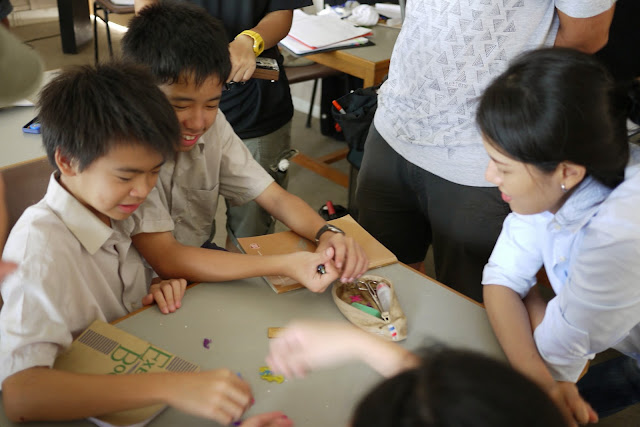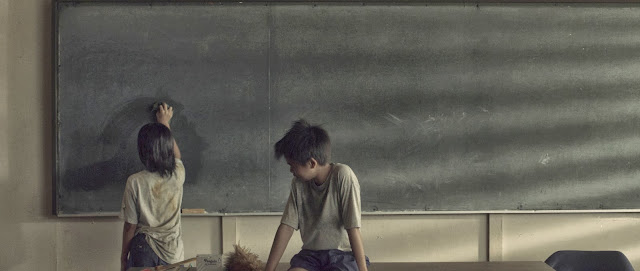Innocents
premiered at the Rome International Film Festival in November 2012, opening the
competition section Alice Nella Citta. The film was also selected for the
Jeonju International Film Festival in April 2013 and recently shown at
the prestigious Shanghai International Film Festival where the film's director, Wong
Chen-Hsi received the Best Director award at the 2013 Asian New Talent Awards.
In the
run-up to an extended screening of Innocents
at The Arts house, the director speaks to SINdie about her film.
SINdie: We're really intrigued by the settings in this
film and would like to discuss more about it. For a start, can you tell us more
about where this mysterious abandoned school is, in and how you stumbled upon
the location?
Chen-Hsi: We shot in an abandoned school compound
along Margaret Drive in Queenstown. In the film, the environment feels really
controlled. The reality is that we shot in very tough conditions. Parts of the
roof had fallen in and there was about 3 inches of bird and bat poop covering
everything. We put on masks and scraped out the place. We recreated the
classroom from scratch, sanding down the rusty windows, repainting the walls
and desks, shifting in the huge vintage chalkboard, reprinting textbooks, all
the way down to ageing stationery boxes. The school was demolished after the
shoot. They left a row of coconut trees but those died.
The longkang was in Old
Holland Road, and felt right for the story because it was so deeply located in
a jungle and felt so secret. It was the heart of darkness we were looking for. We
created winches to hoist equipment up and down the banks, and abseiled the
children down the jungle covered slopes because it was safer than hiking in.
For one of the scenes, our crew had to put all our equipment on dinghies to
transport them deep into the tunnels.
The children run out of school onto the
railway tracks and into the longkangs. So we had to build this fictional
sequence where the railway links to the canal. We had no idea how this would
work, but I slipped and half fell down a slope that was completely hidden
because it was covered with foliage. It turned out to overlook the canal, so we
hacked a path through the undergrowth to break a path for our cast. This was in
the conservation area of Holland Green, with giant spiders, monkeys, monitor
lizards and birds.
How did you get the old SBS bus to film one of the scenes?
We rented the buses from a private transport
company that had older vehicles. I picked the buses based on the color palette.
What was your relationship like, with the children who
play Syafiqah (Nameera Ashley) and Huat (Cai Chengyue)? How did they take to
your direction?
Nameera and Chengyue are wonderful. The film
has no adult leads, so everything rests on them. We went through the regular
casting channels and held open calls at many schools. Eventually we found them at
Greenridge Primary School in Bukit Panjang. They had never acted before, so we
had about two to three weeks of intensive rehearsals before the shoot.
Key dialogue scenes were improvised and
locked down. I gave them the content of the scene, and they rephrased the lines
in their words. Some people feel the kids should be speaking Singlish, but the
lines are exactly what they felt comfortable saying. They also added their own
details like when they were playing with the tin cans in the longkang and when
walking along the railway track, which made it more special than I could have
written.
I love the honesty of what they did – it’s
really rare to see such pared down and intimate performances. You just have to
get them into a really comfortable space. We were really lucky to cast them at
the right age. Both the actors could also really relate to their characters. I
was worried they would not have the stamina to last the shoot, but they amazed
us all.
I enjoy your description of the film as a "tone
poem". Can you explain to our readers what this means and how the film
exemplifies it?
This film was tricky because it is also about
capturing a lost space – the space between childhood and adulthood, and the
space between memory, dream and half-remembered realities. So it seemed that
the best way to tell this story was as a story evoked through mood, music, tone
and imagery, rather than a story that is blatantly told. It’s like sense
fragments that you somehow piece together again.
Please tell us more about the musical motif in Innocents.
Who composed it and what was the creative journey and vision that led to its
birth?
The composer was Rich Ho, and Vincent Tang
was the sound designer. It was very important that the ambiences and sound
design of the film were as much a musical motif, as the music was instrumental
in shaping ambience. Rich did a great job in delivering lyricism to the film,
but without being too pretty. In the longkang theme, we invested in ‘found
sounds’ like plucked rubber bands, to mimic the idea of found objects that
children used as toys. The atonality was also important, because we really
needed to underline the idea of a discordant world. I also have to credit my
editor Jeff Mcmahon, who was instrumental in spotting some of the phrases and
articulating how the story shifts and changes.
I like the random interactions between Syafiqah and Huat (i.e. tapping their fingers on the wall etc.) that develop into light-hearted moments of play. It’s such a minimalist yet beautiful concept, which no doubt, triggers certain bouts of nostalgia.
It’s a different world now, however, and are you commenting on how the young children of this generation may no longer
derive simple satisfaction and happiness from being in the moment?
That was one of my favorite scenes too. We
were not able to shoot the original scene due to some location problem or other.
I had no idea what we would be shooting, even as the crew was lighting the set.
It was really stressful. I finally threw everyone out, closed the door and
improvised something with the kids. The idea of listening was very important –
we had several listening motifs already shot, so it seemed we could build on
that.
It was important to set the film in a
pre-digital, analogue era to assert the very special, deep connection the
children had, despite their relative isolation. That was the main reason to set
the film in the past – the story just would not have worked if the kids were
carrying iPhones. This film does capture a different type of childhood, not
necessarily better or worse, just different.
Many of the scenes show Huat being emotionally blackmailed or manipulated by the female teacher (who strangely seems to have a Filipino accent..). Did you have your own bad experience with a teacher, growing up?
Not exactly. This scene was based on a young
boy I once saw who was publicly and brutally caned, and everybody around just laughed.
The boy was crying intensely, grew hysterical, started slapping himself and
ended up crawling on the ground begging. The actual incident was extreme. I
toned it down for the film – ironically, I think that if I had recreated it
exactly, it would have been too melodramatic.
Children naturally have an awkward and fractious
relationship with authority. Power is a very dynamic concept. After our first
take of the part of the scene where Huat confronts the teacher, the entire
classroom of child extras got up and cheered. But I feel that the teacher is
also someone who is trapped by circumstances.
I’ve had a couple of non-Singaporean teachers
here, so I don’t find the teacher’s accent strange. Though I do remember a comment
from someone who said they could only accept a Filipino accent on a maid, not
an educator. But we forget that when Singapore achieved independence, the
Philippines was more economically and socially advanced than we were.
Extended Run for INNOCENTS at The Arts House:
19 Oct | 7.30pm | Q&A w/ Director & Cast
19 Oct | 7.30pm | Q&A w/ Director & Cast
19 Oct, 20 Oct | 2pm
20 Oct | 7.30pm
20 Oct | 7.30pm
Trailer: http://vimeo.com/52282497
INNOCENTS Page: http://analogrobot.sg/
Facebook: https://www.facebook.com/innocentsfilm






